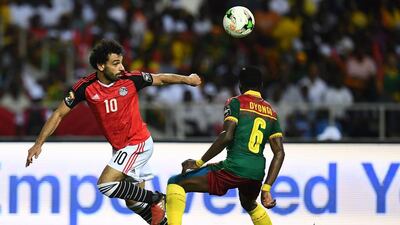The renaissance of Egypt has put a few extra lines on the grizzled face of Hector Cuper, manager of the Pharaohs and their guide to second place at this year’s Africa Cup of Nations.
The pressure of the job, and a recent backlash after the first back-to-back defeats of his two and a-half year tenure is, Cuper says, making this phase of his long career, "the biggest challenge I have known. The constant criticism is stressful."
You might imagine Cuper, a 61-year-old veteran of tight title chases while at Inter Milan, of European Champions League finals with Valencia, and a catalogue of nail-biting end-of-seasons in club management, had developed a thicker skin. Then again, Cuper has learnt, via more silver medals than he cares to count, that nerves are tested most when the big prizes seem nearest.
Cuper spent Saturday afternoon preparing for Sunday’s meeting with Congo in Alexandria while monitoring the other fixture in African qualifying Group E. His stress-levels will have lowered after Uganda and Ghana played out a goalless draw. It means Egypt require just three points to confirm their place at Russia 2018. Beat Congo and they will reach a first World Cup for 28 years with a match in hand.
_____________________________________________
- Richard Jolly: Five issues Gareth Southgate must address before England head to Russia
- Gianluigi Buffon: Italy must take 'responsibility' after shock draw with Macedonia
- Neymar: Brazil forward blasts 'inhuman conditions' in Bolivia following goalless draw
_____________________________________________
Should they make it, few would begrudge a country that has won as many Nations Cups – three – as anybody since the turn of millennium and suffered the sharpest of descents after their last, in 2010: A domestic league suspended for the best part of two seasons following the horrific Port Said stadium tragedy of 2012 and subsequent political upheaval; failing to even qualify for three Nations Cups on the trot.
Cuper, scorned lately for his tactical caution in losses to Uganda, and to Tunisia in Nations Cup qualifying, has restored a great deal of kudos.
But the man who has brought back panache to Egypt is Mohamed Salah, the phoenix for his generation of Pharaohs. He made his debut for the national team when Egypt were losing status and confidence, back in 2011. His first game for Egypt, then still African champions, would be a chastening defeat to Sierra Leone; his first goal was scored in a humiliating losing cause, at home to the Central African Republic. Results like those were a running commentary on how the mighty had fallen.
But as Salah got on and began to build a precocious reputation in European club football, at Basel in Switzerland, Egypt sensed they had a star in the making. By the time he was 23, he had been signed by Chelsea - where he was underused - and had two heavyweight clubs, Fiorentina and Roma squabbling over his medium-term future.
More than €80 million (Dh345m) has been spent on him in transfer fees since he first went from Arab Contractors to Basel, and already the €40m-plus Liverpool paid Roma in June looks good value.
Salah has four goals in six Premier League starts for his new club, a couple in four Champions League outings, maintaining the sort of ratio of goals-to-games he established at Roma; this from a striker who tends to zip along the flanks more than through the middle of the attack, who serves up as many decisive passes as finishes.
For Egypt, in this World Cup campaign, Salah has become indispensable. He has scored in each of the three narrow victories that made them the pacesetters of their qualifying group, including the strike in the 1-0 home win over Uganda, and the equaliser in Congo, before setting up the late winner in that contest.
Cuper will look to Salah for incisions again against Congo, the more so in the absence through injury of Abdallah El-Said, his most reliable alibi in attack, and Egypt will do so for many campaigns ahead.
At 25, Salah is of an age to imagine he may be at his peak at the time of the first World Cup to be staged in the Middle East, in Qatar in 2022. With his all-round game, Egyptians hope that even when his acceleration is no longer such an obvious forte, Salah might still be leading their line in 2026.
In the meantime, just one World Cup place, the one they can almost touch, would be the achievement of a generation.


